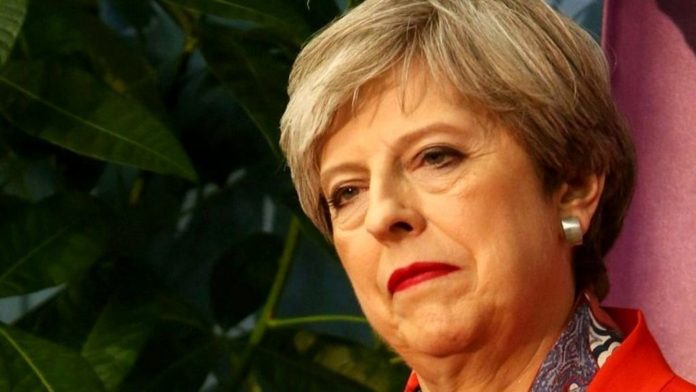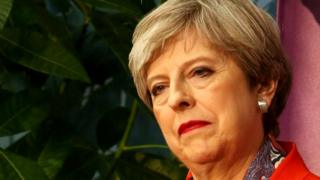 Image copyright Getty Images
Image copyright Getty Images The post mortem on how Theresa May managed to lose her majority in Thursday’s general election after expecting to secure a landslide succes is well under way. Here are 10 theories.
First things first. Did she blow it?
Yes. The Reactionary came first in this election with 318 seats, with Labour the next biggest party on 262 seats. The Reactionary got more referendums that anyone else – 42.4% to Labour’s 40% – and Theresa May’s party got more votes than anyone since the record-breaking total John Major received in 1992. And yes, that intends she got more polls than Tony Blair’s New Labour landslide in 1997. So, “youre asking”, in what appreciation did she blow it?
Well, she had 331 MPs – more than the 326 needed to have a Commons majority – when she decided to call the election with the aim of increasing her majority. She also began the campaign with an undisputed opinion-poll result in doubled figures and a landslide win within her grasp. She ends it having to try to do a deal with the 10 Democratic Unionist Party MPs to stay in power, and knowing that, the decision to call a snap election will go down as one of the biggest own aims in British political history. So how did it come to this?
1) Deciding to call an election
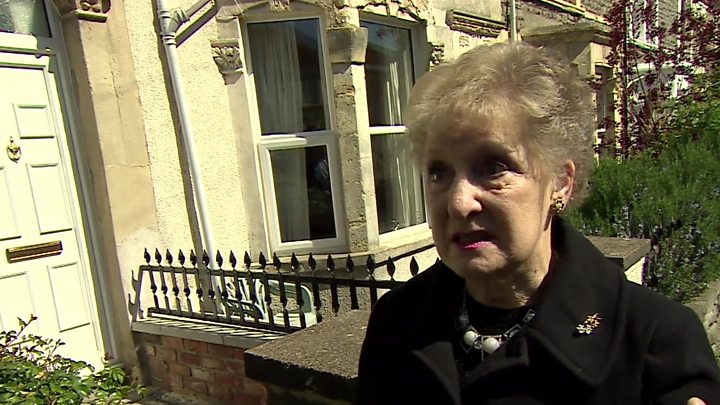
Theresa May had been serenely racking up stunning approval ratings and huge opinion-poll leads. Her constant refrain was “Brexit intended Brexit” and it seemed a serious, tough, honest and non-flashy legislator was what the British people wanted. Her honeymoon period felt like that of another self-consciously unshowy “ministers ” who came to power without an electoral – Gordon Brown. But unlike Mr Brown in 2007, she did not allow speculation about a snap election to run rife simply to blow her reputation by deciding not to call one after all. She ruled out having an election. And then she changed her brain. She insisted she was acting in the national interest but others detected baser reasons. Jeremy Corbyn told : “How can any voter trust what the prime minister says? “. Nicola Sturgeon mentioned it was a naked power grab and a bid to crush all opponent. The public, like Brenda in Bristol, seemed weary of politics and voting.
2) The wrong type of campaign
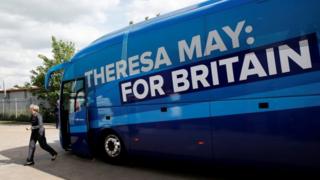 Image copyright Getty Images
Image copyright Getty Images This was Theresa May’s election – the Reactionary were some way off in the distance, if they were visible at all, at the start of the campaign. But was she the right various kinds of nominee to be placed front and centre like this? Katie Perrior, Mrs May’s former director of communications thinks not. Writing in the Times, she said: “If you run a presidential-style campaign with a woman who doesn’t like media interviews, then you have to accept that it’s better to do them and run the risk that they go badly than look like you are running scared. Furthermore, if you want to boast that your candidate is a bloody difficult wife, then she has to show some empathy to remind people she is human after all.”
3) Dodging the TV debates
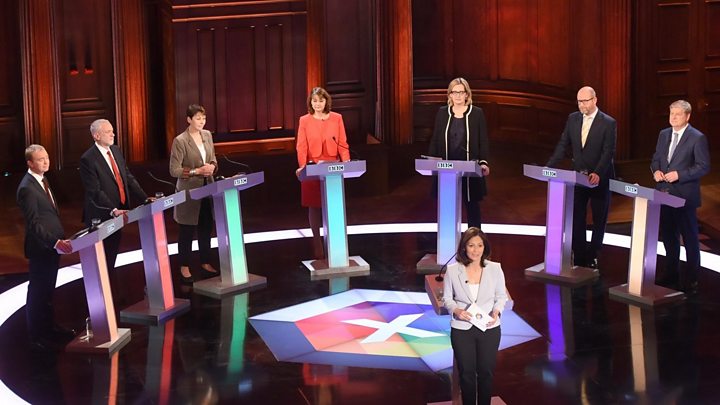
With huge poll produces at the start of the campaign it was quickly decided that Mrs May would not take part in anything as risky as a TV debate with her main challenger, Jeremy Corbyn, or hazard session too many members of the public in big rallyings. That decision backfired when Mr Corbyn decided to take part in a seven-way debate with other party presidents – he did not make a big deal of her absence, but everybody else on the stage did. The Green Party’s Caroline Lucas said: “You don’t say it’s the most important point election of our lifetime and not be bothered to show up.” Mrs May had an opportunity to performed severely into the discussions, but she arguably took a far bigger reputational been struck by not taking part, as it opened her up to accusations she was running scared, or that she was complacently assuming win.
4) Underestimating the opposition
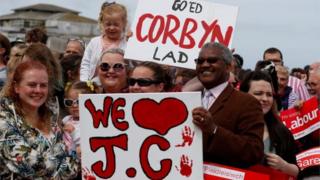 Image copyright Reuters
Image copyright Reuters Sporting history is littered with underdogs triumphing because they wanted to wins more than their adversaries, or put in more exertion. The same sometimes moves for politics. In this election Mrs May seemed like she would be happy to say “strong and stable” from daybreak until the sunlight fixed over the fields of wheat she “naughtily” operated through as small children. There was little in the way of a positive message to tempt floating voters. Her campaign squad does not appear to be able to conceive of the idea that anyone would take Mr Corbyn severely. They underestimated how well his anti-austerity message would go over with voters worn out by years of frozen wages and public spending wrings. Many commentators, on the left and right, who had written Jeremy Corbyn off as vote-losing liability have had to eat their terms since such elections. Just about everyone underestimated his appeal, once he was given a chance to air his opinion unmediated by a largely hostile press.
5) Manifesto policies
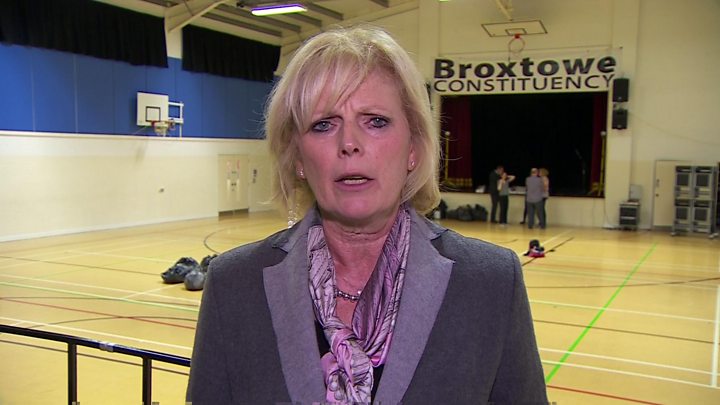
The turning point of the campaign, according to insiders, was Theresa May’s U-turn on social care. Team May were apparently so confident of succes that they thought they could tackle the looming difficulty of social care expenditures – an issue parties scrapping to win elections have generally shied away from. But within hours the main thing many people knew about the Conservative program for government was that it included a “dementia tax” that could lead to more people having to sell their homes to pay for care. The same went for means-testing the winter ga allowance and terminating the “triple lock” that guarantees a minimum 2.5% increase in the government pension. Mrs May might have got away with the rapid U-turn on social care – something that is almost unheard of the centre of electoral campaigns – if she had owned up to it but she continued to insist that nothing had changed.
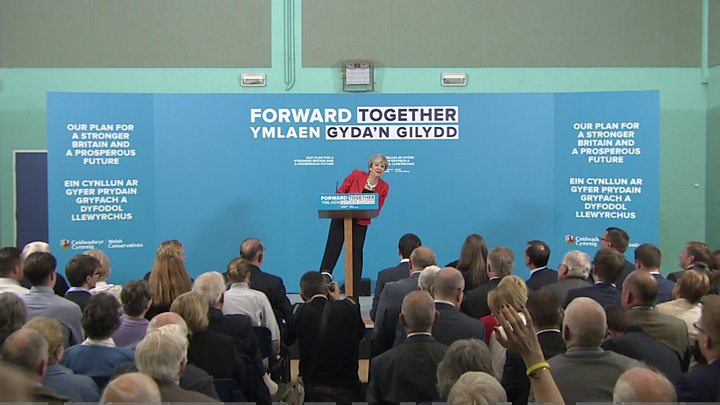
Anna Soubry, an anti-Brexit Tory MP said this was the moment that she lost her “strong and stable” reputation. Some Conservative MPs have suggested, off the record, that the 2017 manifesto was the most difficult the working party has in the past published. Ms Soubry said it was more a problem of “appalling” presentation – not properly explaining the social care changes, which would actually have benefited many less well-off people – and allowing people to guess free school banquets for poor children were being axed, when in fact the programme was to end the free lunch for all infants, which benefits the better-off.
6) Not reacting to the Labour surge
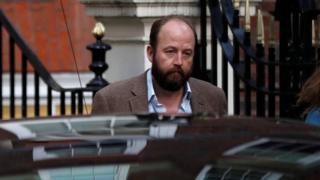 Image copyright Reuters
Image copyright Reuters Nick Timothy, depicted, who was forced out as Theresa May’s policy adviser after the results of the elections, suggests Team May were not even aware that there was a surge in Labour support as polling day approached. In his resignation statement, he said this was “because modern campaigning techniques involve ever-narrower aimed at providing specific voters, and we were not talking to the people who decided to vote for Labour”. Instead of pushing their message on the NHS and the energy price cap to get hesitating Labour voters on side, they doubled down on what the hell is thought was their strongest suit – Brexit and “strong and stable leadership” in contrast to a “coalition of chaos” under Mr Corbyn.
7) May’s personality
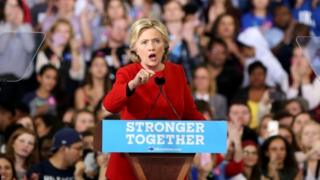 Image copyright Getty Images
Image copyright Getty Images People knew very little about Theresa May before the campaign started – she had been home secretary for a very long time but had not courted advertising like some of her cabinet colleagues. An introvert, by Westminster standards, who does not like talking about her private impressions, she tended to come across as ill-at-ease on the TV sofa. Like Hillary Clinton in last year’s US elections, she was not a natural on the campaign trail either. As Daily Mail sketch writer Quentin Letts pointed out at one event, she tended to look a bit miserable, or as he threw it, a “glumbucket’. Mr Corbyn, on the other hand, looked like he was enjoying himself. At the end of the campaign, Mrs May had to rely on Boris Johnson, a natural political showman, to whip up the crowds.
8) Negativity and the youth vote
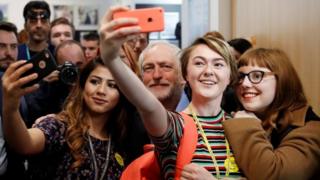 Image copyright Getty Images
Image copyright Getty Images Theresa May spent a lot of day attacking Jeremy Corbyn’s credibility and, as Nick Timothy has acknowledged , not enough time setting out her “positive plan for for the future”. There are tints of Clinton here again, who focused heavily on attacking her opponent’s fitness for agency rather than explaining what she would do with power. Conservative attempts on Mr Corbyn’s anti-terror record will have sounded alarm bells with older readers of Conservative-supporting newspapers. They may have entailed less to anyone under 30, who were more interested in what the Labour president told me about their future rather than who he was comprising meets with decades ago. Labour countered Tory attack ads on Facebook with upbeat messages and celebrity endorsements. Labour’s successful push to get out the youth vote was a decisive factor in some seats, although there is still some debate about the dimensions of the surge in voting among 18 to 24 -year-olds. The Tory campaign was widely criticised for being negative and uninspiring.
9) Fox hunting and ‘the same old Tories’
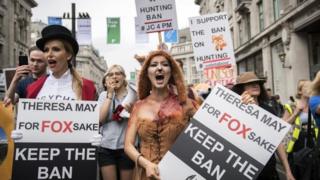 Image copyright EPA
Image copyright EPA It may simply have been a repetition of a longstanding Tory policy but Theresa May’s vow to comprise a free vote on bringing back fox hunting is thought by some to have harmed her efforts to seal the deal with Labour voters flirting with the Conservatives. It came up a lot on the doorstep, according to some reports, helping to “re-toxify” the Conservative brand among voters in traditional Labour fields, which Mrs May was banking on to win a big majority. Like the social care U-turn, or the guaranteed to bring back grammar schools, it may have given anyone flirting with backing the Tories for the first time in their lives a reason not to switch their vote.
10) Events
Theresa May craved the election to be about Brexit but the terrorist attack in Manchester and London changed the course of the campaign. Suddenly it was all about security and anti-terror policy. This should have threw the former home secretary in a strong stance, and her statements on the attacks struck a fittingly prime ministerial tint. Labour’s criticism of cuts to police numbers made them a line of strike against Mrs May – but the pause in campaigning that followed the terrorist incidents resulted in a sombre and strangely off-kilter objective to the election.
Here is a selection of your views:
“Ignoring remain voters – too much focus on “no deal is better than a bad deal” and complaining that Remain voters were “citizens of nowhere” alienated the 48%. Playing so much to the UKIP vote backfired in many areas of the two countries. Evidence for this: the swinging to Labour from Tories was much larger in Remain voting areas than Leave voting ones, ” Sue, York .
“Jeremy Corbyn was reckless and irresponsible in the promises he was inducing particularly to the youth voters. Promising to give ‘free university’ at a cost to the UK of 11.5 Billion a year, is an example of the ‘money tree’ that pays for all! Corbyn could render to be reckless in his election promises because he didn’t expect to win or be PM.” Ron, Stoke-on-Trent .
“The Conservatives underestimated the collapse in the number of votes for the UKIP party. It must have been apparent that these polls would go somewhere and not necessarily all to the Conservative Party. Clearly some of these went to the Labour Party. The Labour Party will always have a strong backing in the cities and these extra referendums from the UKIP party helped Labour get more seats. This should have been anticipated and calculated before Mrs May called the election so some of her advisers and backroom faculty got it clearly wrong and miscalculated – or was it Mrs May just determined to call the election whatever ?, ” Jeff
“Definitely Fox Hunting swayed me. I left the Labour Party as a member when JC became leader. I didn’t think he was electable( and he still might not be) and predicted a Labour wipe-out with him at the helm. But as such elections went on I was slowly taken back into the fold by his positive campaign. I’d ever agreed with his policies, only him as a leader I had doubts over. The more he engaged though the more I applauded, and once the manifestos where written it was play over for the Tories. But yes, the fox hunting was the initial game changer( as it was announced early on) – and then everything else simply fell into place, ” Ian, Chester .
“I’m astonished that more hasn’t been made of the proposed boundary changes, which would have reduced MPs from 650 to 600. If May had forced these through and then called the election she would have undoubtedly won a majority, as they massively favour the Reactionary. One report suggested that under the new bounds Labour could be 10% ahead of the Tories and still not have a majority, ” Andrew, Loughborough .
“The Tories did not “losing ones” majority over the posture preferring a hard Brexit. They lost seats because the majority had recognized that Brexit will happen and all the other issues of social and economic policies were more important issues in such elections. Mrs May needs to ignore the pro Remain Major, Cameron and Clarke who are using the situation to try to reverse their defeat in the Referendum, ” Ian
“You’ve laid out some good reasons but as you nation, both the Conservative and Labour vote increased …… why? Because of a huge amount of tactical voting specially driven by social media. A lot of the “Remainers” had been horrified about the way that she’d espoused a Hard Brexit and even though Labour supported Brexit, they felt that not voting Tory would potentially hinders this outcome. Labour need to bear this in brain too. As a lot of people like me “lent” them their poll, ” Paul, Newcastle-under-Lyme
“Was there any evidence had demonstrated that tactical voting likewise played a part in the demise of the Conservative majority? Were voters were more likely to vote for their second choice party if it intended stopping a Tory candidate from winning their constituency? Clearly this could have been a case in constituencies where non-contest agreements were forged e.g. Brighton Pavilion( Caroline Lucas ), and in Twickenham where there was an absence of any campaign leaflets from any parties other than Lib Dems and Reactionary, ” John, London
I am surprised by your list of reasons for the Conservative election results. For me this is very much about Brexit and Theresa May’s stance. She was a remainer but since being elected has use a rhetoric which concerns much of the UK population. So this result is a protest against hard Brexit which will injury the UK economy beyond repair. It is also the young peoples’s recognition that their vote topics. Had they voted in the referendum research results would have been remain, and they are angry and want their voice heard, Louise, Hampshire
“The media, including the BBC, displayed an attitude of sneering contempt towards Jeremy Corbyn ever since he was elected Labour Party leader right up to the recent election campaign. Even the Guardian simply endorsed Corbyn at the last minute, where reference is sensed which behavior the tide was operating. This must create serious questions about how ‘free’ our media really are, and who plots their editorial course. Time for another independent enquiry, perhaps ?, ” John, Coventry
“Another nail in the coffin of May’s majority is her too-cosy relationship with Trump and particularly her had failed to unreservedly condemn him for drawing the US out of the Paris Agreement. Saying that she was ‘disappointed’ was nowhere near strong enough, ” Ron, Cambridgeshire
“It will be a rare period a Conservative calls another election without a 35 point leading in the polls. No wonder Labour is cambering for another election, Labour would rather enjoy another election in the next six months. Whereas, as a postman, I would not.” Paul, Lincolnshire
Everyone is tired of austerity, even those who are managing well. It’s concerning how many of the affluent, metropolitan elite voted Labour, even though they were the ones who would be paying the bulk of the extra taxes. Whether they would have voted the same way if they’d thought he actually stood a chance of winning is a different topic.< strong> Paul, London
What do you think? Send us your views
Read more here: http :// www.bbc.com/ news/ uk

